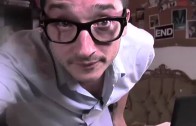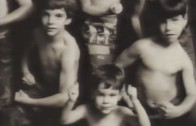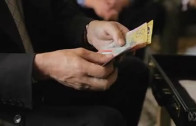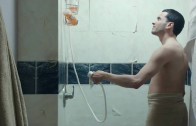Esc & Ctrl
Esc & Ctrl is an online series of short documentary films where journalist and filmmaker Jon Ronson explores some aspects of screen culture and the Internet. By exemplifying the concepts of control of information and the screen culture’s reactions to publishing, censorship, viral videos, media attention and manipulation; a small set of stories weave together to pose bigger questions around democracy and open communication in the age of the computers and a corporately mediated virtual world.
Series
The series starts with a YouTube video by a man named Marc Pax who claims he experienced homophobia when trying to work with the Free Gaza Movement in Palestine. With it being discovered that this man was not actually Marc Pax, but an actor named Omer Gershon, this episode sets out to investigate what the true intentions behind this suspicious video are. What is revealed is the technique of ‘astroturfing’—the name given to fake grassroots campaigns posing as genuine stories—as a powerful technique used by the powerful in the corporate sphere of ‘social media’ websites to continue to disseminate propaganda with a new twist at attempted authenticity.
Part two invokes the stories of Wendell Potter and Nataline Sarkisyan to explore how corporations and other unpopular organisations have embraced Astroturfing as an extension of their control over public discourse; and the reputations and perceptions of their organisations in the media and “bloggersphere.” The two come together as Wendell Potter, who is a former health insurance manager of the company CIGNA, resigned over the story of Nataline Sarkisyan who died as a result of CIGNA refusing to provide a critical liver transplant as she battled with Leukemia. The refusal by the company sparked an uprising from bloggers who took to the streets of California in protest, showing all corporations that grassroots movements can be very influential when organised well. However this became a model that the same corporations co-opted and replicated as a marketing tool. We see how Astroturfing can alter public viewpoints and create enough doubt around an issue to obfuscate, confuse or simply inhibit action. Wendell Potter, since becoming a whistle-blower, speaks about this and spreads awareness of the corrupt health-insurance industry.
After it is known that the Marc Pax video is a hoax, the question still remains of who commissioned the Astroturfing. Jon Ronson gets a lead that Omar Gershon may be in Tel Aviv and so travels there to speak with members of Latma Studios, Ben Hartman from the Jerusalem Post, and members of the Israeli government about the creation of the Marc Pax video. Hartman thinks the video may have be created by the Israeli government’s PR department called the ‘Ministry for Public Diplomacy,’ and the government is keen to speak with Ronson to ‘set the record straight.’
During the Arab Spring uprising, Vodafone not only colluded to shut down the telecommunications network at the time when the government would request—pre-empting uprising—but also after the fact, to relay government propaganda in an attempt to stifle further resistance. Documents found to exist were later shredded and destroyed, but some lasting information reveals the use of the surveillance tool FinFisher which is made by Gamma International in England, exemplifying how multi-national corporations dominate global communications and interplay with repressive regimes the world over, with extreme consequences in the real world.
Jon Ronson visits Patrice Wilson, the person responsible for the YouTube video hit ‘Friday’ by Rebecca Black. The video received over two-hundred million views, and he says he can do it again. Jon is treated to a track made by Patrice, in Patrice’s quest for ‘viralness.’
Jon Ronson visits a web analyst who, along with his colleagues, has developed bots for the social media service Twitter. The bots generate random tweets with varying avatars in an experiment to see which bots can steer and manipulate a conversation amongst real human users most effectively.
As an extension from the previous episode, academics formerly working at Warwick University create a spam bot using Jon Ronson’s name and image on twitter. Jon is frustrated at the existence of the bot and the banality of the tweets made in his likeness. He requests the owners take it down. The owners refuse. The spam bot is not a spam bot they say, but a “repurposing of social media data into an infomorphic aesthetic,” and that Jon’s request to remove it is “interesting.” To resolve this disagreement, Jon meets the creators and controllers of the bot who talk about psychological power and control over their former students, and in Jon’s case, argue the same. They say they’re out to explore and understand the tyranny of algorithms that affect people’s lives, invoking a false analogy of the algorithms micro-trading on Wall Street.
Jon Ronson meets with Frances Kelly, the founder of the website Carer Watch, a forum for people who stay at home to look after relatives with disabilities. The website got taken down indirectly by a company called Atos. The company conducts surveillance and investigations on the recipients of welfare benefits for the UK government, and in this story, Atos sets out on a rapacious mission to control its reputation and public image by causing websites to be closed down using simply the threat of invoking libel laws.
Patrice Wilson had expressed some concerns about Part Five of this series in which he says he felt unfairly portrayed. To remedy this, Jon offered he record a new song and together the two shoot a music video. When asked to think of a topic which sparks passion, Jon tells Patrice about his Tuesdays going to the movies which forms the basis of the track Patrice wants to go viral.
With the series coming to an end, Jon Ronson makes one more attempt at finding Omer Gershon, the actor who appeared in the YouTube video from Part One claiming to have experienced homophobia from the Free Gaza Movement. How did Omer get involved? Why did he make the video? Who is behind it? These questions are asked of Omer when Jon finds him in Tel Aviv.
In the final episode, Jon talks about creating the music video for Patrice’s song ‘Tuesday.’ Patrice talks about the video going viral while Jon wonders will this really take off as a moment of embarrassment for the whole world to see? The series ends with some reflections on the screen culture framed through this experience with Patrice.




